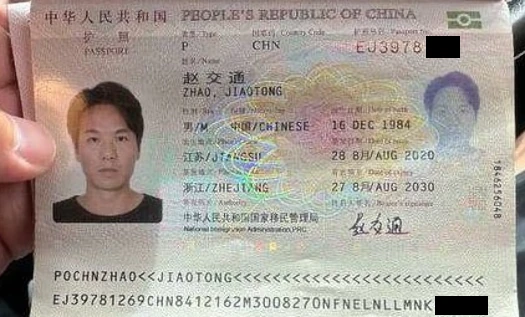E-Creator “click a button” Ponzi collapses, admin arrested
 E-Creator was a typical “click a button” Ponzi targeting Zimbabwe.
E-Creator was a typical “click a button” Ponzi targeting Zimbabwe.
Run through a mobile app, E-Creator’s ruse was “clicking a button” to create fake product orders.
Remarkably, after E-Creator collapsed Zimbabwean authorities were able to make an arrest.
A Chinese national and two local accomplices were caught at the airport trying to flee the country.
Zimbabwean authorities have released the passport of arrested Chinese national Jiaotong Zhao.

An accompanying July 13th press-release from the Zimbabwe Republic Police reads;
The Zimbabwe Republic Police confirms the arrest of Zhao Jiaotong (39) in connection with a case of fraud in which unsuspecting members of the public were duped through (the) E-Creator Ponzi scheme.
The Zimbabwe Republic Police is inviting members of the public who might have been duped through E-Creator to report at any nearest Police Station.
The Herald additionally reports Zhao enlisted Zimbabwean nationals Justin Kuchekenya and Trymore Tapfumaneyi as accomplices.
Two other locals, Billy Thomas Syedou and Abraham Mutambu, remain at large.

For reference, E-Creator launched in February 2023 and collapsed on or around June 30th. While BehindMLM tries to keep on top of “click a button” Ponzis, E-Creator wasn’t on our radar.
Total E-Creator losses are unknown but “thousands” of Zimbabweans are believed to have invested into E-Creator.
Zhao is believed to have been trying to escape Zimbabwe with roughly $1 million. Far more is believed to remain unaccounted for.
With E-Creator having collapsed, why Zhao was still in Zimbabwe is unclear.
Following a July 17th hearing, Zhao and his two accomplices were denied bail as obvious flight risks. As of July 31st, the suspects are believed to still be in custody.
If threatened with prison time, interrogation of Zhao might shed light on how Chinese scammers proliferate their “click a button” Ponzis from country to country.
Typically a “click a button” Ponzi targets a specific geographical area; either one country or a group of neighbouring countries.
The Ponzi almost always accepts cryptocurrency (typically USDT), but often also uses local payment options (typically mobile payment app accounts registered with bogus details).
In the case of E-Creator, tether was used and local payments were organized through EcoCash.

Once they feel critical mass is reached, Chinese scammers shut the “click a button” Ponzi down without warning.
If enough investors were milked and the scammers feel they can further milk the population, reload “click a button” Ponzis are launched.
Otherwise they just disappear, safe from prosecution abroad.
This makes the arrest of Zhao particularly interesting. While it’s unlikely he’s anyone of significance in the organized crime group(s) running “click a button” Ponzis, his presence locally suggests initial recruitment might be kicked off in person.
I figured the Chinese scammers just reached out to local scam promoters of social media and that’s how they got going. If lackeys are being sent in-person to get the ball rolling, this opens up a window for local authorities – but only if they act in a timely manner.
Unfortunately “click a button” Ponzis typically come and go before local authorities know they exist.
For their part, Chinese authorities couldn’t care less so long as “click a button” Ponzi scammers don’t target China.
Update 15th August 2023 – Abraham Mutambu has been arrested.


Rare Zimbabwe W.
Here’s to more arrests in other countries so I can stop reviewing these braindead app Ponzis.
Nooooo. Keep them in a bucket,since most of it is copy-paste you can just do a template,add some pics and then on busy days hammer out a few of them haha.
That sounds good in theory. But then the news starts rolling in daily and before I know it my review list is backed up with the stupid things.
Prison in Zim is a death sentence regardless of what you get. Bad food (if at all), TB, Aids, Hepatitis, brutality, gangs and lots of rape.
We won’t hear aboutthis guy again
Same thing happened to Fiji. But using a different name for the platform.it was es-eefz.net.
Alot of fijians are suffering from this. The scammers blocked the web and ran away